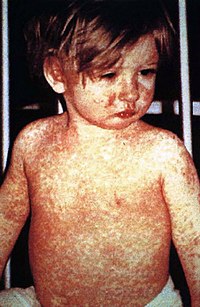
Photo from wikipedia
Introduction: Measles is an endemic but largely neglected disease in Lao People’s Democratic Republic. New-borns are protected by maternal antibodies, but antibody waning before measles vaccination at 9 months of… Click to show full abstract
Introduction: Measles is an endemic but largely neglected disease in Lao People’s Democratic Republic. New-borns are protected by maternal antibodies, but antibody waning before measles vaccination at 9 months of age leaves infants susceptible to infection. In this study, the susceptibility window of infants was determined to generate scientific evidence to assess the national measles immunization strategy. Methods: Between 2015 and 2016, demographic data, medical history, and blood samples were collected from 508 mother-child pairs at the provincial hospital in Vientiane. The samples were screened with a commercial kit detecting anti-measles IgG antibodies. Results: The large majority (95.7%) of the mothers were seropositive for anti-measles IgG and antibody titers of the mothers and infants were highly correlated (p < 0.01). While at birth 97.7% of the infants were seropositive, seropositivity rates decreased to 74.2% two months later to reach only 28.2% four months after birth (p < 0.01). Just before the first dose of the measles-rubella vaccine, scheduled at 9 months of age, was actually given, less than 14% of the infants were seropositive. Conclusion: This alarmingly wide susceptibility gap due to rapid maternal antibody decay leaves infants at risk of measles infection and serious disease complications. A high herd immunity is crucial to protect young infants and can be achieved through improved routine vaccination coverage and (expanded age group) supplementary immunization activities.
Journal Title: Pathogens
Year Published: 2021
Link to full text (if available)
Share on Social Media: Sign Up to like & get
recommendations!